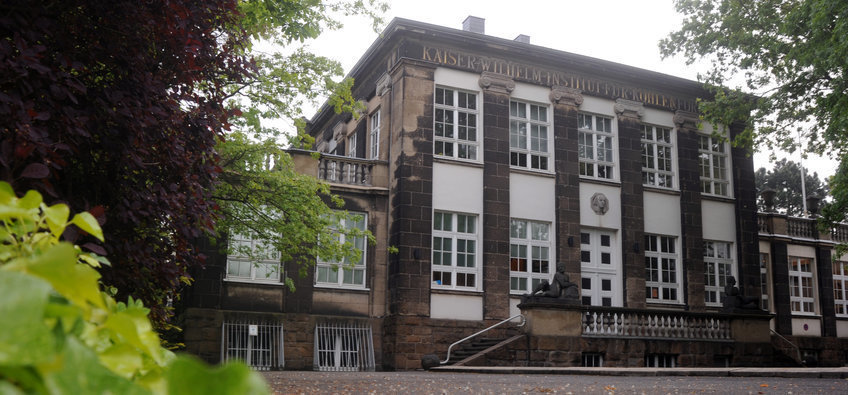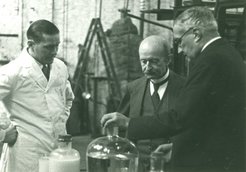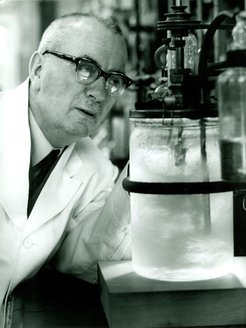
History

The Max-Planck-Institut für Kohlenforschung is one of the oldest institutes within the Max Planck Society and the oldest scientific research institution in the Ruhr area. It was founded in 1912 as Kaiser-Wilhelm-Institut für Kohlenforschung and started operations in 1914. Its foundation was due to the fact that coal was still little investigated chemically at the beginning of the 20th century and should be better used in the future.

The greatest scientific success of the early years was undoubtedly the discovery of the Fischer-Tropsch synthesis by Franz Fischer and Hans Tropsch in 1925. This process, in which coal is liquefied by indirect hydrogenation and which is used primarily to produce synthetic fuels, is still being used successfully worldwide today.

After Franz Fischer had retired in 1943 Karl Ziegler became director and changed the scientific orientation of the institute. Away from predominantly application oriented research, Ziegler moved towards basic research, which he described as "general synthetic chemistry". His focus was especially on various polymerization reactions.
This led to the discovery of the low-pressure process for the production of polyethylene in 1953: Karl Ziegler had invented modern plastics, which now began its triumphal march throughout the world! In 1963 he was awarded the Nobel Prize for Chemistry for this.
Ziegler's research work was continued under his successor Günther Wilke, who headed the institute from 1969. Wilke and his colleagues focused on the organometallic chemistry of nickel. This work was not only groundbreaking in their immediate field, but also influenced the development of transition metal chemistry and catalysis as a whole. From the point of view of application technology, the scientific basis for plastics made of polyamide 12 should be mentioned here, which are characterised by their particular dimensional stability and durability.
With the appointment of Manfred T. Reetz as director in 1993, a comprehensive restructuring of the institute began. Reetz, who himself covered the field of organic chemistry, initiated the expansion of the institute's board of directors to five directors, each of whom heads a scientific department. In doing so, he laid the foundation for the current organizational structure.
The change in organisational structure was also accompanied by a redefinition of the scientific objectives, which were now grouped around the central theme of catalysis.
For more than 100 years now, the outstanding research achievements and excellent reputation of the MPI Kofo have attracted scientists from all over the world, who find excellent conditions for their work in Mülheim.
Timetable
| 1912 | The Kaiser-Wilhelm-Gesellschaft, representatives of the Rhenish-Westphalian Industries and the town of Mülheim an der Ruhr decide to create the Kaiser-Wilhelm- Institut für Kohlenforschung. | |
| 1913 | Franz Fischer (Technical Universität Berlin) is appointed as the first Director of the Institute. | |
| 1914 | Opening and inauguration of the Institute | |
| 1925 | Franz Fischer und Hans Tropsch file a patent for the synthesis of petroleum at normal pressure ("Verfahren zur Gewinnung mehrgliedriger Paraffinkohlenwasserstoffe aus Kohlenoxyden und Wasserstoff auf katalytischem Wege", DRP 484337). | |
| 1925 | Foundation of "Studien- und Verwertungsgesellschaft mbH". | |
| 1939 | The Institute becomes an independent Foundation. | |
| 1943 | Karl Ziegler (University of Halle) succeeds Franz Fischer as Director. | |
| 1949 | Karl Ziegler and Hans-Georg Gellert discover the "Aufbaureaction" with aluminum alkyl compounds. | |
| 1949 | The Institute is renamed the Max-Planck-Institut für Kohlenforschung. | |
| 1953 | First patent application for the low-pressure polyethylene synthesis (DBP 973626, K. Ziegler, H. Breil, E. Holzkamp, H. Martin, inventors). | |
| 1958 | An independent department of radiation chemistry is set up under the supervision of Günther O. Schenck. | |
| 1963 | The Nobel Prize for Chemistry is awarded to Karl Ziegler and Giulio Natta (Milan) | |
| 1968 | Karl Ziegler and his wife Maria create the Ziegler Fund to ensure the Institute financial independence. | |
| 1969 | Günther Wilke succeeds Karl Ziegler as Director of the Institute. | |
| 1970 | The process for the decaffeination of green coffee beans is patented (DBP 2005293, K. Zosel, inventor). | |
| 1970 | Karl Ziegler establishes the Ziegler Foundation. | |
| 1973 | Karl Ziegler dies in Mülheim. | |
| 1981 | The Senate of the Max-Planck-Society establishes the department of radiation chemistry as an independent institution named the Max-Planck-Institut für Strahlenchemie. | |
| 1993 | Manfred T. Reetz (University of Marburg) succeeds Günther Wilke as Director of the Institute. | |
| 1998 | Alois Fürstner and Ferdi Schüth are appointed as Scientific Members and Directors. | |
| 1999 | Walter Thiel (University of Zürich) is appointed as Scientific Member and Director. | |
| 2002 | The Ziegler Collection Foundation is founded. | |
| 2005 | Benjamin List is appointed as Scientific Member and Director. | |
| 2010 | Opening of the new lecture hall building. | |
| 2014 | The Max-Planck-Institut für Kohlenforschung celebrates its 100th birthday. | |
| 2015 | Tobias Ritter is appointed as Scientific Member and Director. | |
| 2018 | Frank Neese is appointed as Scientific Member and Director. |




